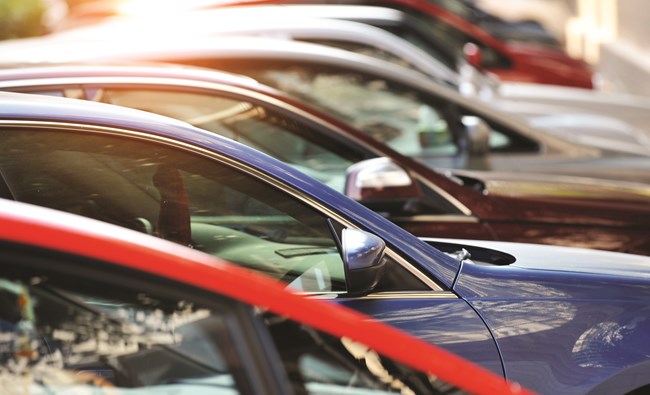We use cookies to ensure that we give you the best experience on our website. If you continue without changing your settings, we will assume that you are happy to receive all cookies on the Business Car website. However, if you would like to, you can change your cookies at any time

The start point for the best source of fleet information |
Fleets still driving new car market growth
Date: 06 March 2023 | Author: Sean Keywood

The UK new car market saw its seventh consecutive month of year-on-year growth in February, with fleet sales continuing to be a significant factor.
Data from the Society of Motor Manufacturers and Traders (SMMT) has revealed 74,441 new cars were registered last month - a 26.2% increase on February 2022.
This included a 46.2% increase in fleet registrations, which took 58.8% of the overall market, while private registrations saw 5.8% growth for a 39.5% share, and the business segment, classed as to fleets with fewer than 25 vehicles, saw 0.7% growth for a 1.8% share.
The continuing big fleet registration increases, which have been seen for several months, follow a period last year where manufacturers were prioritising private sales at the expense of the corporate market.
According to the SMMT, easing supply chain shortages steered the market closer to pre-pandemic levels, as last month was only 6.5% down on February 2020.
In terms of fuel mix, the biggest growth last month was seen by conventional hybrids, up by 40% for a 12.9% market share.
Strong growth was also seen in mild hybrid petrol registrations, up by 38.6% for a 13.5% market share, and conventional petrols, up by 34.9% for a 43.4% share.
Pure EVs also saw continued growth, up by 18.2% - however, the resulting 16.5% market share was slightly down on the 17.7% seen in February 2022.
Mild hybrid diesel registrations grew by 8.9% for a 2.8% market share, while plug-in hybrids grew by only 1% to take 6.3% of the market, down from 7.9% 12 months previously.
The worst performing fuel type was pure diesel, down by 14.6% to take only 4.5% of the overall market.
The SMMT said that the new car market was now looking towards a year of double-digit growth, and said that the UK Government's upcoming Budget was an important opportunity to shape Britain's net zero progress and deliver an equitable transition for all.
It said this should include a long-term plan for chargepoint investment, an alignment of VAT on public charging with domestic energy use, and a review of the Vehicle Excise Duty premium that it said would unfairly penalise EV buyers in the future.
SMMT chief executive Mike Hawes said: "After seven months of growth, it is no surprise that the UK automotive sector is facing the future with growing confidence. It is vital, however, that government takes every opportunity to back the market, which plays a significant role in Britain's economy and net zero ambition.
"As we move into 'new plate month' in March, with more of the latest high-tech cars available, the upcoming Budget must deliver measures that drive this transition, increasing affordability and ease of charging for all."
Reacting to the figures, Lloyds Banking Group transport managing director Nick Williams also looked towards the Budget.
He said: "February has seen another promising month for EV uptake, with 12,310 new vehicles registered. However, if our charging infrastructure is to adequately service the growing number of EVs, it will need significant expansion, both in terms of the volume and the distribution of chargepoints across the country.
"Drivers will be looking to the Treasury to confirm investment that will support the UK's charging network.
"Similarly, individuals and businesses will be hoping to see continued incentives for choosing a zero emissions vehicle over a higher carbon alternative, with policies put in place that take a fair, emissions-based approach. By supporting the UK's infrastructure, industry and drivers, the Chancellor can help maintain the momentum the country is rapidly building on its electrification journey."
Novuna Vehicle Solutions managing director Jon Lawes said: "While electric vehicle registrations continue to rise at a steady rate, the UK risks falling behind other leading European countries in the transition to EVs and green transportation.
"Failure to intervene to adequately support the industry, notably to build a more robust supply of battery technology has stymied the UK's progress to date.
"With the budget fast approaching, it is clear that the government needs to significantly pledge to ramp up investment in the UK automotive supply chain to meet industry demand or risk compromising its 2030 targets."
Close Brothers Motor Finance director of sales Lisa Watson said: "Keeping up the positive outlook reflected in January's new car registration statistics, February's 26.2% rise similarly shows upbeat signs that the motor industry is getting back on its feet following the challenges faced over the past couple of years.
"Crucially, the easing of supply chain disruptions has enabled manufacturers to plough on with production and tackle the backlog of pre-ordered vehicles. However, whilst there continues to be sufficient demand, dealers should stay cautious and considerate of the cost-of-living crisis and, moreover, its impact on the customers' financial concerns and, decisions.
"Likewise, as we edge closer and closer to the government's net-zero plan to phase out the sale of new petrol and diesel vehicles by 2030, attention needs to be given to the concerns of those customers who are reluctant to make the switch to EV, including worries about the cost of electricity and access to charging points."
The Vauxhall Corsa was the UK's top-selling car last month with 2,818 registrations, ahead of the Vauxhall Mokka with 1,805, and the Ford Puma with 1,590.
Completing the top ten were the Nissan Juke (1,561 registrations), Hyundai Tucson (1,528), Tesla Model Y (1,482), Volkswagen T-Roc (1,360), Ford Fiesta (1,303), Kia Sportage (1,262), and the Toyota C-HR (1,244).











